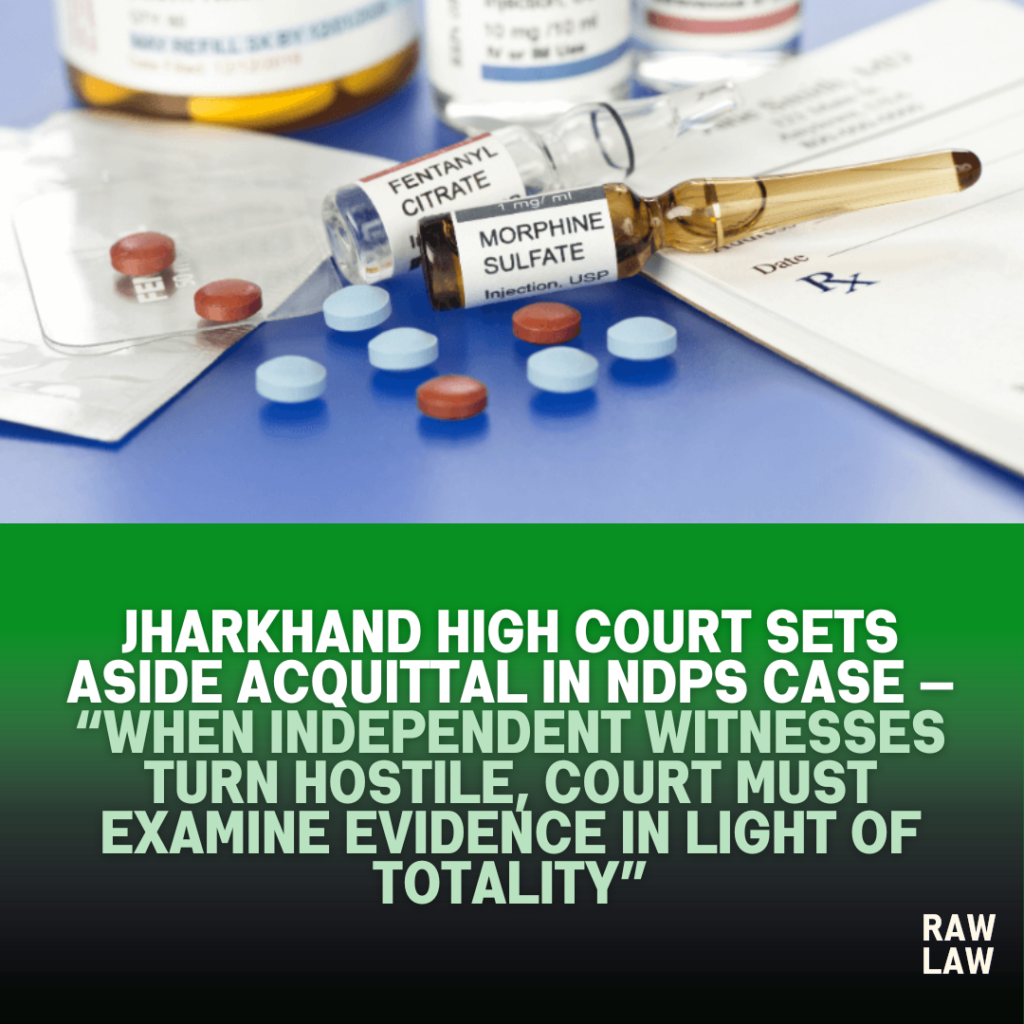Court’s Decision
The Jharkhand High Court allowed the State’s appeal, setting aside the acquittal recorded by the trial court in a prosecution under the Narcotic Drugs and Psychotropic Substances Act, 1985 (NDPS Act). The Court convicted the accused for possession of contraband and sentenced him in accordance with law. The Court held that the trial court erred in discarding the prosecution’s evidence solely because independent witnesses turned hostile, despite the consistent testimonies of police officials and compliance with procedural safeguards under the NDPS Act.
Facts
The prosecution alleged that during routine patrolling and checking at a public place, the police intercepted the accused and recovered a significant quantity of contraband from his possession. The contraband was seized in the presence of independent witnesses, and the accused was informed of his right under Section 50 of the NDPS Act. Samples were collected, sealed, and sent for chemical examination, which confirmed the seized substance was a narcotic drug.
The trial court acquitted the accused on the ground that independent witnesses did not support the prosecution’s case and there were alleged discrepancies in the evidence. The State challenged this acquittal before the High Court, contending that the trial court misread the evidence and overlooked the statutory presumption under Section 54 of the NDPS Act.
Issues
- Whether the trial court erred in acquitting the accused solely on the basis that independent witnesses turned hostile.
- Whether the evidence of police officials, coupled with compliance with NDPS procedural requirements, is sufficient for conviction.
- Whether the statutory presumptions under Sections 35 and 54 of the NDPS Act were properly applied.
Petitioner’s (State’s) Arguments
The State argued that the trial court misapplied the law by insisting on corroboration from independent witnesses when the testimonies of police officials were credible, consistent, and corroborated by documentary evidence. It was submitted that minor discrepancies in the statements did not affect the core of the prosecution’s case. The State further contended that all mandatory provisions, including Section 50 compliance, were fulfilled and the recovery was proved beyond reasonable doubt. The chemical examination report confirmed the substance as contraband, and the statutory presumption under Section 54 should have been invoked.
Respondent’s (Accused’s) Arguments
The defence contended that the prosecution’s case was unreliable due to the absence of credible independent corroboration. The independent seizure witnesses turned hostile, casting doubt on the alleged recovery. It was argued that procedural lapses occurred, including improper sealing and failure to maintain a clear chain of custody. The defence maintained that the trial court’s acquittal was based on a sound appreciation of evidence and should not be disturbed in appeal.
Analysis of the Law
The Court examined Sections 35, 50, and 54 of the NDPS Act, noting that the Act places a reverse burden on the accused once possession of contraband is established. The Court reiterated that the testimony of official witnesses cannot be discarded solely because they are police personnel, provided their evidence is cogent, trustworthy, and inspires confidence. It held that Section 50 compliance was duly proved, as the accused was informed of his right to be searched before a Magistrate or a gazetted officer, and the search was conducted accordingly.
Precedent Analysis
The Court relied on several Supreme Court decisions:
- State, NCT of Delhi v. Sunil, (2001) 1 SCC 652 — Held that police testimony can be relied upon without independent corroboration if found credible.
- Surinder Kumar v. State of Punjab, (2020) 2 SCC 563 — Reiterated that minor contradictions in the testimony of prosecution witnesses do not affect the core case if recovery is otherwise proved.
- Mohan Lal v. State of Punjab, (2018) 17 SCC 627 — Clarified the principles regarding compliance with procedural safeguards in NDPS cases.
These cases were used to establish that the trial court should have evaluated the prosecution evidence in its entirety, rather than focusing solely on hostile witnesses.
Court’s Reasoning
The Court held that the trial court failed to appreciate that the hostility of independent witnesses does not by itself demolish the prosecution’s case if official witnesses are reliable. It emphasised that the police witnesses’ testimony was consistent, corroborated by seizure memos, and supported by forensic evidence. The mandatory provisions under Sections 42, 50, and 57 were complied with, and the defence failed to rebut the statutory presumption under Section 54.
The Court also noted that procedural safeguards in NDPS cases are intended to ensure fairness, not to provide technical loopholes for acquittal when substantive evidence exists.
Conclusion
The High Court allowed the appeal, set aside the acquittal, and convicted the accused under the relevant provisions of the NDPS Act. The Court imposed the sentence prescribed under law, considering the quantity of contraband recovered.
Implications
This ruling reinforces that in NDPS cases, credible testimony of police officials, when supported by documentary and forensic evidence, can sustain a conviction even if independent witnesses turn hostile. It also clarifies that trial courts must apply statutory presumptions under the NDPS Act appropriately and not ignore them due to minor procedural inconsistencies.
Referred Cases and Their Relevance
- State, NCT of Delhi v. Sunil — Established that police testimony can be relied upon even without independent witness support.
- Surinder Kumar v. State of Punjab — Minor inconsistencies in prosecution evidence do not vitiate the case if core facts are intact.
- Mohan Lal v. State of Punjab — Laid down compliance requirements for procedural safeguards in NDPS prosecutions.
FAQs
Q1: Can a conviction under the NDPS Act be based solely on police testimony?
Yes, if the testimony is credible, consistent, and corroborated by other evidence, such as seizure memos and forensic reports.
Q2: What happens if independent witnesses turn hostile in NDPS cases?
Their hostility does not automatically weaken the prosecution’s case if official witnesses are reliable and other evidence supports the recovery.
Q3: How important is Section 50 compliance in NDPS cases?
It is mandatory, but if properly complied with, as in this case, the prosecution’s case remains strong despite other challenges.



